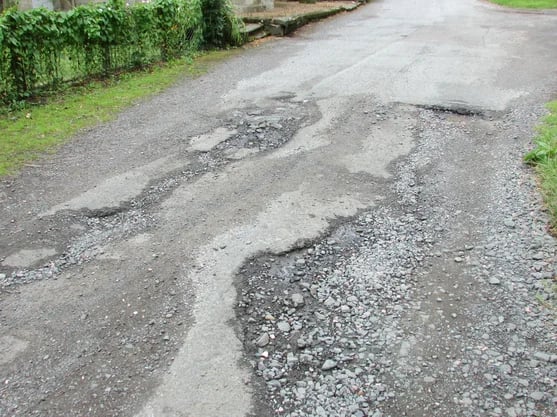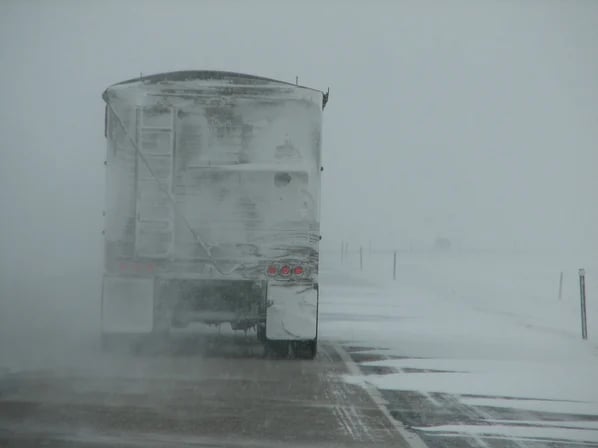One of the most significant benefits of being in the business of helping people manage their fleets is learning where the challenges are and focusing energy on finding solutions for them. Data plays a crucial role in effective fleet management. Not just having it but being able to quickly and accurately collect it and then easily use it for the company's benefit. Through 30 years of successfully consulting for mobile-reliant industries, adapting modules to service-specific industries, and growing services to fit the evolving needs of fleet managers the world over, we’ve hopefully learned a few things on how to be helpful to them: It’s all about the data at your fingertips in your Fleet Management Software.
The USA experiences some of the busiest traffic globally, with over 250 million registered vehicles and over 210 million licensed drivers. Recent statistics indicate an annual average of approximately 40,000 vehicular-accident deaths, most involving heavy and light commercial trucks. The number of road accidents involving commercial vehicles, gathered from injury lawyers, insurance companies, and government sites, can be associated with various causative factors.
1. Vehicle malfunctions
Equipment malfunctions are a significant cause of accidents with commercial vehicles. Trucks are commonly subject to multiple usage-related malfunctions, particularly when emergencies and deadlines have them running for a long duration of time without being properly inspected and serviced. Having peripheral devices that connect and send real-time data from your asset’s onboard computer to a fully integrated Fleet Management System (FMS) like Site Manager 2.0 (SM2) is more than efficient; it could save lives.
The most common truck malfunctions experienced today include:
- Brake malfunction – commonly results from the brakes failing to grip accordingly when pressed due to potential wearing out of certain critical brake parts. For example, broken brake fluid pipes can lead to brake fluid leakage and loss of braking power. Air brakes can also suffer catastrophic failure due to leakage or blockage in the air pressure tanks and pipes. It’s safe to say that running a commercial truck at full speed with no brakes will be dangerous for your driver and other motorists. Solution: The Vehicle Data Unit (VDU)
- Tires blowout is usually associated with the tires being over or under-inflated. It also occurs
 when the truck is overloaded beyond its maximum recommended capacity. Tire blowouts lead to a loss of vehicle control and can end in catastrophic damage; at high speeds, the driver could even roll the truck or crush other vehicles. Furthermore, a tire blowout could dislodge the load from its fixated position, pour it onto the road, and thereby endanger other motorists. Solution: The Vehicle Data Unit (VDU)
when the truck is overloaded beyond its maximum recommended capacity. Tire blowouts lead to a loss of vehicle control and can end in catastrophic damage; at high speeds, the driver could even roll the truck or crush other vehicles. Furthermore, a tire blowout could dislodge the load from its fixated position, pour it onto the road, and thereby endanger other motorists. Solution: The Vehicle Data Unit (VDU) - Engine failures – sudden, total engine failures are rare among commercial vehicles; engine warning lights usually precede them. When they occur, the driver often experiences a loss of steering and braking power. The degree of panic following such loss of control increases the prospects of causing multi-vehicle road accidents. Solution: The Vehicle Data Unit (VDU)
Other common malfunctions include loss of electric connection on vital parts such as headlights, hazard, and indicator lights. These types of failures reduce the vehicle's visibility and impact the reaction times of other road users, effectively increasing the chances of being hit by nearby cars. Loss of indicator function implies that truck drivers cannot effectively warn other road users of essential decisions such as changing lanes, thereby increasing the chances of getting hit by other cars. Moreover, when not properly managed, such malfunctions can cause catastrophic crashes involving the commercial truck alone or lead to a cascade of accidents. All these are simple and regular maintenance issues. When treated as cost overruns associated with cost-cutting measures lead to maintenance procrastination and an increase in accidents and vehicle downtime. Solution: SM2-Maintain - The Integrated Maintenance Module in your FMS.
2. Overloading vehicles
Commercial trucks are designed to carry heavy loads; however, they have a recommended tonnage capacity limit for good reasons. Some transport companies push the load capacity limits to meet their financial targets. Unfortunately, when the risk doesn’t pay off, the detrimental effects on the performance of the vehicles on the road can break the bank.
The truck’s ability to accelerate and stop on the road is, for instance, highly dependent on its load. Overloaded vehicles are simply more prone to mechanical failures and causing severe road accidents. Firstly, overloaded vehicles bear more weight than recommended on the tires, thus accelerating wear and tear. Secondly, the excessive weight on the tires is known to increase the likelihood of tire bursts or dislocation of wheels from their axles. Furthermore, excessive loads increase the occurrences of tilting, jackknifing, and rolling. All lead to severe damage whether or not the truck is in high traffic. For the most part, a good fleet manager will properly train his drivers to watch out for this common issue, but common sense isn’t always so common. Solution: SM2-Maintain - The Integrated Maintenance Module in your FMS & the Vehicle Data Unit (VDU).
3. Driver's lack of experience and competence
Competence in commercial vehicle and truck driving is crucial. It seems logical that drivers should be appropriately certified, assessed, licensed, and trained to operate their vehicles according to the rules where they will be driving them. But what do you do once they drive off and are out of sight? How do you know what behaviours need additional training? Top fleet managers know that a good FMS, like SM2-Locate, will have an integrated geolocation module connected by an Equipment Tracking Unit (ETU), enabling them to get live data about the driver’s whereabouts and driving behaviours. This direct connection forms a team that can address performance changes as needed and makes them more efficient.
4. Human errors
 The most common road accidents today involve motorists failing to observe traffic rules. Commercial vehicle drivers spend long hours on the road, often spending as little time as possible resting. The pressure to meet tight delivery deadlines and make their return trips on time typically pushes many commercial truck drivers past their limits. With increased fatigue comes less attentiveness to road safety regulations. It can cause the driver to fall asleep at the wheel and veer into oncoming traffic or off the road. This recklessness and neglect lead to an increase in accidents. Although federal regulations have been put in place targeting limiting the number of hours drivers clock on the road, few truck drivers consistently adhere to such regulations. So, it’s up to the fleet manager to manage the safety of his drivers and those on the roads with them. Solution: SM2-Locate - The Integrated Geolocation Module in your FMS & Equipment Tracking unit (ETU).
The most common road accidents today involve motorists failing to observe traffic rules. Commercial vehicle drivers spend long hours on the road, often spending as little time as possible resting. The pressure to meet tight delivery deadlines and make their return trips on time typically pushes many commercial truck drivers past their limits. With increased fatigue comes less attentiveness to road safety regulations. It can cause the driver to fall asleep at the wheel and veer into oncoming traffic or off the road. This recklessness and neglect lead to an increase in accidents. Although federal regulations have been put in place targeting limiting the number of hours drivers clock on the road, few truck drivers consistently adhere to such regulations. So, it’s up to the fleet manager to manage the safety of his drivers and those on the roads with them. Solution: SM2-Locate - The Integrated Geolocation Module in your FMS & Equipment Tracking unit (ETU).
The following few causes fall into the past and the future of innovative solutions. With the advent of more intelligent safety features on vehicles, such as proximity alarms, cameras, adaptive cruise control, and more, we are seeing more possibilities for safer roads.
5. Poor road conditions
The road condition is an essential factor for dispatchers and drivers alike. Routes need to be shorter to save on the high fuel cost, safer for the driver, and longer vehicle life. With easy access to hands-free mobile devices in the trucks, dispatchers can use onboard computers, GPS systems, and driver information to help plot the safest and most cost-efficient routes.
Various road conditions impact a driver’s ability to control their vehicles effectively.
- Uneven road surface – uneven road surfaces contribute to poor traction and lead to skidding for heavier trucks. Thus, increasing road accidents.
- Presence of potholes – potholes are equally detrimental to a truck driver’s ability to achieve vehicle control and to the life of the truck. Drivers try as much as possible to avoid potholes by swerving, thereby increasing the probability of hitting other vehicles or rolling over.
- Insufficient and inaccurate road labelling – Some roads are inaccurately labelled or lack road signs. Such roads increase the likelihood of causing accidents. For example, a road whose bumps are not clearly indicated may confuse drivers who hit the bumps at high speed and lose control.
- Absence of road guardrails – In cases where the rails are missing, the prospects of trucks and commercial vehicles toppling over the edges are significantly high.
6. Weather conditions
Weather conditions affect the roads and driving conditions in many ways: reduced traction on wet or icy roads, reduced visibility in heavy rain, snow or fog, and fluctuating tire pressures in extreme heat or cold. More and more technology that integrates into Fleet management systems and the modules the dispatchers rely upon is becoming available. For more information on some of these possibilities, please contact our support team at info@coencorp.com

7. Distracted or impaired driving
By now, we all know the impact of texting and mobile phone use while driving. Driving under the influence is also a well-known cause of accidents. As mentioned above in the section on human errors, monitoring technology is improving, and the days when standard onboard sensors will direct the vehicle to stop at the indication of alcohol or automatically block hands-on cell phone use are indeed not far away. Until then, there may be more creative solutions using what currently exists. Possible Solution: SM2-Locate - fleet telematics and real-time fleet GPS equipment tracking unit(ETU).
In conclusion, if you are already using an adaptable, customizable, and fully integrated Fleet Management System, the solutions you may need the most are potentially already at your fingertips. Our technical team is ready to help you get your fingers on it with answers to your questions, additional documentation and training of our systems. We are looking forward to helping you keep your fleet moving.
Coencorp Technical Support: 1-866-263-6267
#safety #fleetsafety #preventivemaintenance #fleetmanagement #dedicatedtosafety
